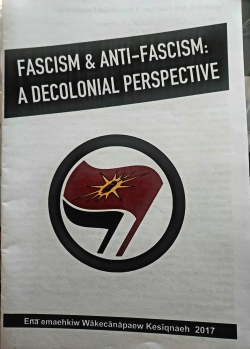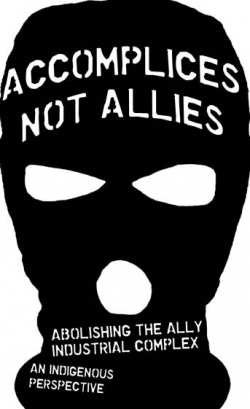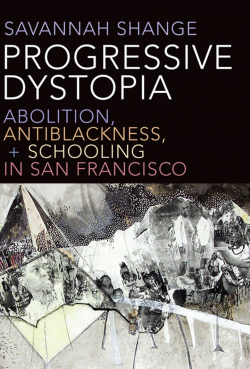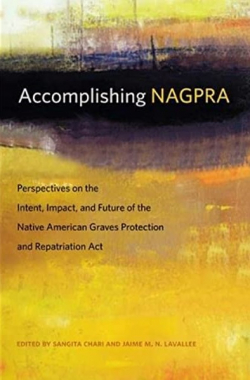Fascism & Anti-Fascism: A Decolonial Perspective

Book Stores
Type
Book
Authors
Kesiqnaeh ( Ena emaehkiw Wakecanapaew Kesiqnaeh )
Category
Education
[ Browse Items ]
Publication Year
2017
Publisher
Indigenous Action Media, United States
URL
[ private ]
Pages
14
Abstract
The zine begins with:
In the wake of the election of Donald Trump to the south of the colonial border, there’s been a blooming of discussion on fascism and the necessity for anti-fascist organizing amongst various left-wing streams of thought (anarchists, Marxists, anti-racists etc.). This has only increased in the wake of his inauguration, the subsequent series of worrying (though unsurprising) executive orders that he has issued since taking the office, and the resistance that has flourished against them.
Whether or not Trump himself is a fascist is a question that’s up for debate (many who argue that he is no doubt point to claims by one of his ex-spouses that he sleeps/slept with a volume of Hitler’s speeches next to his bed). It is also arguable that several key political figures within his inner circle, such as Steve Bannon, are para-fascist. Undeniable though is that Trump and his closest advisers are right-wing national-populists, which in the context of north amerikan settler colonialism is, invariably, inseparable from white nationalism.
Likewise, it is undeniable that a number of explicitly white nationalist organizations have been highly motivated and emboldened by Trump and his broad popular support amongst amerikan settlers, across gender and class lines, who perceive amerika as having been betrayed and dirtied by immigrants, “minorities,” queers, feminists and a neoliberal capitalism that has sent industrial jobs overseas. Driven by these broad feelings of white ressentiment, and thirsting for a new frontier, these prophets of naked and proud white power, such as Richard Spencer, rallied to Trump’s campaign, and now presidency. Whether they will continue to stay in Trump’s corner though is yet to be seen.
Additionally, as I write this from kanada it would be foolhardy to believe that this country is hermetically sealed from what has been going on south of the border. Prominent figures in the race to replace Stephen Harper as the leader of the federal Conservative Party have sought to emulate Trump’s rhetoric, and have even openly called for bringing his message here. Do not forget that before Trump’s executive orders barring immigration from seven Muslim majority countries and authorizing the building of a wall on Mexican border, the late Harper administration passed the nakedly Islamophobic Zero Tolerance for Barbaric Cultural Practices Act, as well as the Anti-terrorism Act, 2015 (Bill C-51) and the Strengthening Canadian Citizenship Act (Bill C-24), two laws which have respectively strengthened the already existing kanadian police state and allowed for the stripping of kanadian citizenship from dual citizens and those with the ability to obtain dual citizenship. None of these are issues that been positively acted upon by the current Liberal Party government of Justin Trudeau.
Most strikingly, and tragically, of course, is the recent shooting at the Islamic Cultural Centre of Quebec City. This event, which cost six lives, was carried out by a French-speaking settler who openly espoused support for the right-wing national-populism and Islamophobic politics of Trump as well as Marine Le Pen in France. Many fear that acts such as this could be the tip of the iceberg, rather than some sort of isolated long-wolf type incident.
In general, while the emergence of the north amerikan far-right goes back further than Trump, and was certainly emboldened by the election of Barack Obama as the first non-white person to the office of the president, Trump’s campaign and subsequent electoral victory has undeniably led to a marked acceleration of the movement. For the time being, naked white nationalists feel that they now have one of their own in the White(st) House, or, at the very least, someone who will lend them their ear when they come calling and who’s movement they can springboard off of in order to further build their own.
I also know and want to recognize, that many people are scared as well of the current situation. As I noted in my commentary on the Trump election, my mother called me at nearly 3 in the morning to tell me that she felt like she was going to throw up in light of. Similarly, my brother, who is generally no liberal, told me that he felt as though he may have to leave his job because of the smothering atmosphere of Trumpian white nationalism in his workplace. Since the election I’ve read what seems like daily updates of the fear, depression and rage felt by many of my fellow Indigenous scholars, and many, many non-scholars, as Trump has re-activated pipeline deals, ordered the construction of a border wall to keep out our Indigenous family from south of the Rio Grande, and hung a painting of perhaps amerika’s most prolific Indian killing president, Andrew Jackson, in the Oval Office. The fears and worries being experienced and expressed by family, friends, colleagues and comrades across Turtle Islaare is palpable, and it would be cold, as well as disingenuous, for me to not give space and voice to those feelings.
Bracketing off some of these issues though, what I want to do here is to ask a basic question: what is fascism? And, more particular to what I want to say here, what does fascism mean to Indigenous people? Is it even a useful analytic category for us in light of existent settler colonialism? Also, what does anti-fascism mean to us in light of the struggle for decolonization?
In the wake of the election of Donald Trump to the south of the colonial border, there’s been a blooming of discussion on fascism and the necessity for anti-fascist organizing amongst various left-wing streams of thought (anarchists, Marxists, anti-racists etc.). This has only increased in the wake of his inauguration, the subsequent series of worrying (though unsurprising) executive orders that he has issued since taking the office, and the resistance that has flourished against them.
Whether or not Trump himself is a fascist is a question that’s up for debate (many who argue that he is no doubt point to claims by one of his ex-spouses that he sleeps/slept with a volume of Hitler’s speeches next to his bed). It is also arguable that several key political figures within his inner circle, such as Steve Bannon, are para-fascist. Undeniable though is that Trump and his closest advisers are right-wing national-populists, which in the context of north amerikan settler colonialism is, invariably, inseparable from white nationalism.
Likewise, it is undeniable that a number of explicitly white nationalist organizations have been highly motivated and emboldened by Trump and his broad popular support amongst amerikan settlers, across gender and class lines, who perceive amerika as having been betrayed and dirtied by immigrants, “minorities,” queers, feminists and a neoliberal capitalism that has sent industrial jobs overseas. Driven by these broad feelings of white ressentiment, and thirsting for a new frontier, these prophets of naked and proud white power, such as Richard Spencer, rallied to Trump’s campaign, and now presidency. Whether they will continue to stay in Trump’s corner though is yet to be seen.
Additionally, as I write this from kanada it would be foolhardy to believe that this country is hermetically sealed from what has been going on south of the border. Prominent figures in the race to replace Stephen Harper as the leader of the federal Conservative Party have sought to emulate Trump’s rhetoric, and have even openly called for bringing his message here. Do not forget that before Trump’s executive orders barring immigration from seven Muslim majority countries and authorizing the building of a wall on Mexican border, the late Harper administration passed the nakedly Islamophobic Zero Tolerance for Barbaric Cultural Practices Act, as well as the Anti-terrorism Act, 2015 (Bill C-51) and the Strengthening Canadian Citizenship Act (Bill C-24), two laws which have respectively strengthened the already existing kanadian police state and allowed for the stripping of kanadian citizenship from dual citizens and those with the ability to obtain dual citizenship. None of these are issues that been positively acted upon by the current Liberal Party government of Justin Trudeau.
Most strikingly, and tragically, of course, is the recent shooting at the Islamic Cultural Centre of Quebec City. This event, which cost six lives, was carried out by a French-speaking settler who openly espoused support for the right-wing national-populism and Islamophobic politics of Trump as well as Marine Le Pen in France. Many fear that acts such as this could be the tip of the iceberg, rather than some sort of isolated long-wolf type incident.
In general, while the emergence of the north amerikan far-right goes back further than Trump, and was certainly emboldened by the election of Barack Obama as the first non-white person to the office of the president, Trump’s campaign and subsequent electoral victory has undeniably led to a marked acceleration of the movement. For the time being, naked white nationalists feel that they now have one of their own in the White(st) House, or, at the very least, someone who will lend them their ear when they come calling and who’s movement they can springboard off of in order to further build their own.
I also know and want to recognize, that many people are scared as well of the current situation. As I noted in my commentary on the Trump election, my mother called me at nearly 3 in the morning to tell me that she felt like she was going to throw up in light of. Similarly, my brother, who is generally no liberal, told me that he felt as though he may have to leave his job because of the smothering atmosphere of Trumpian white nationalism in his workplace. Since the election I’ve read what seems like daily updates of the fear, depression and rage felt by many of my fellow Indigenous scholars, and many, many non-scholars, as Trump has re-activated pipeline deals, ordered the construction of a border wall to keep out our Indigenous family from south of the Rio Grande, and hung a painting of perhaps amerika’s most prolific Indian killing president, Andrew Jackson, in the Oval Office. The fears and worries being experienced and expressed by family, friends, colleagues and comrades across Turtle Islaare is palpable, and it would be cold, as well as disingenuous, for me to not give space and voice to those feelings.
Bracketing off some of these issues though, what I want to do here is to ask a basic question: what is fascism? And, more particular to what I want to say here, what does fascism mean to Indigenous people? Is it even a useful analytic category for us in light of existent settler colonialism? Also, what does anti-fascism mean to us in light of the struggle for decolonization?
Number of Copies
1
| Library | Accession No | Call No | Copy No | Edition | Location | Availability |
|---|---|---|---|---|---|---|
| Main | 191 | 1 | Yes |



![[Tranquila Zine] a d.i.y zine on how to deal with YOUR anxiety. from the perspective of everyday brown, chicanx, indigenous, latinx chicxs!](https://ae85df921b92073b52e8-a126a45a4c59e90797d94cd877fbe744.ssl.cf3.rackcdn.com/books/cover/uc-5b5cebd870f80.jpg)
